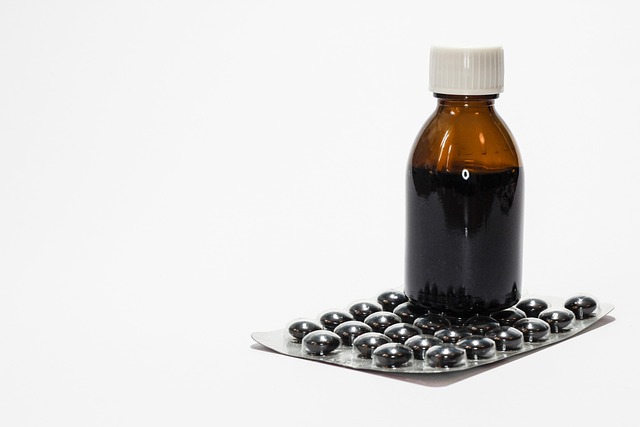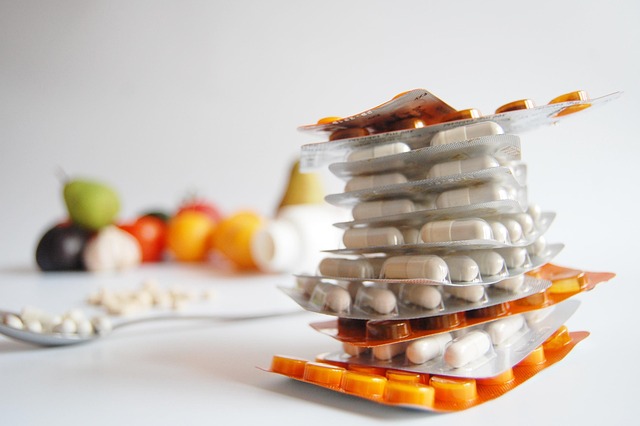Before getting prescribed semaglutide, disclose all medications, vitamins, and supplements to prevent drug interactions that may impact its effectiveness or increase side effects related to diabetes, heart conditions, or gastrointestinal issues. Regular communication with healthcare providers ensures safe treatment by managing symptoms like nausea, vomiting, changes in blood sugar levels, and heart rhythm. Be aware of potential interactions with over-the-counter drugs, herbal supplements, and alcohol to maximize benefits and minimize health risks.
Before getting prescribed semaglutide, understanding potential drug interactions is crucial. This hormone-like medication offers significant benefits for managing type 2 diabetes, but its effectiveness can be altered by other medications you may be taking. From prescription drugs to over-the-counter options and herbal supplements, this guide explores common interactors, their effects on semaglutide therapy, and how to monitor adverse reactions to ensure safe and optimal treatment outcomes.
Understanding Drug Interactions: A Basic Guide

Getting prescribed semaglutide, like any medication, comes with the responsibility to be aware of potential drug interactions. Drug interactions occur when a substance, in this case, another medication or supplement, affects how your body processes semaglutide. This can change its effectiveness or even increase the risk of side effects. It’s crucial to inform your healthcare provider about all medications, vitamins, and supplements you’re taking to help them identify potential issues.
Understanding these interactions is a basic guide to ensuring safe and effective treatment. Semaglutide itself may interact with other drugs, including those for diabetes, heart conditions, or gastrointestinal issues. Some common side effects of drug interactions include altered blood sugar levels, changes in heart rhythm, or increased risk of nausea and vomiting. By proactively discussing your medications during doctor’s visits, you can avoid these complications and make informed decisions regarding your health.
Prescribing Semaglutide: Potential Risks to Consider

When a patient is considering getting prescribed semaglutide, it’s crucial to be aware of potential risks. Semaglutide, an injectable medication used for type 2 diabetes management, has shown significant efficacy in lowering blood sugar levels. However, like any prescription drug, it comes with its own set of considerations. One key risk is the possibility of gastrointestinal side effects, including nausea, vomiting, and diarrhea, which can be severe in some cases. These symptoms often occur as the body adjusts to the medication but can impact a patient’s quality of life if not managed properly.
Additionally, semaglutide may cause hormonal changes that could lead to various adverse effects. For instance, patients might experience increased appetite or even depression due to the changes in hormone levels. It’s essential for healthcare providers to monitor these symptoms and provide adequate support to ensure patient safety and satisfaction throughout their treatment with semaglutide. Regular check-ins and adjustments in dosage or medication can help mitigate risks while reaping the benefits of this effective diabetes management tool.
Common Medications That Interact with Semaglutide

When getting prescribed semaglutide, it’s crucial to be aware of potential drug interactions. Semaglutide, a medication often used for type 2 diabetes management, can have significant effects when combined with other drugs. Common medications that interact with semaglutide include those used for treating high blood pressure and cholesterol levels. For instance, beta-blockers and statins, which are prevalent prescriptions, may alter the way your body processes semaglutide, potentially leading to adverse reactions or reduced efficacy.
Additionally, certain antibiotics, anti-inflammatory drugs, and immunosuppressants can also interact with semaglutide. These interactions may cause changes in how semaglutide is absorbed or metabolized by your body. Always inform your healthcare provider about any other medications you’re taking to ensure safe and effective treatment when prescribed semaglutide.
Over-the-Counter Drugs and Their Impact on Semaglutide

When considering getting prescribed semaglutide, it’s crucial to be aware of potential drug interactions, especially with over-the-counter medications. Semaglutide, a medication often used for type 2 diabetes management, can have its efficacy and safety affected by other substances. Over-the-counter drugs like antihistamines, certain painkillers, and even herbal supplements can interfere with semaglutide’s action. This interaction might lead to reduced effectiveness of the treatment or unanticipated side effects.
Therefore, it’s essential for patients to disclose all medications and supplements they are taking to their healthcare provider. They should also be mindful of common over-the-counter drugs that could interact with semaglutide, such as those containing nifedipine or ketoconazole. By being proactive in cross-checking these interactions, patients can ensure optimal results from their semaglutide treatment and minimize any potential risks.
Herbal Supplements: What You Should Know Before Taking Semaglutide

Before getting prescribed semaglutide, it’s crucial to be aware of potential interactions with herbal supplements. Semaglutide is a medication used for type 2 diabetes and weight management, so understanding its compatibility with other substances is essential for optimal health outcomes. Many herbal supplements can interfere with the effectiveness or increase the side effects of semaglutide. For instance, certain herbs known for their blood-sugar-lowering properties, such as cinnamon or bitter melon, might impact how well your body processes semaglutide. Similarly, supplements that enhance metabolism or suppress appetite could alter the medication’s effects on blood sugar and weight loss.
To avoid these complications, it’s important to inform your healthcare provider about any herbal supplements you may be taking. They can guide you on safe alternatives or adjustments needed before beginning treatment with semaglutide. Regular cross-checking of potential interactions ensures that this life-changing medication can work effectively and safely within your body.
Alcohol Consumption: Effects on Semaglutide Therapy

Alcohol consumption can significantly impact the effectiveness and safety of semaglutide therapy, a medication often prescribed to manage type 2 diabetes. While moderate drinking may not pose substantial risks, excessive alcohol intake can lead to altered drug metabolism and increased side effects associated with semaglutide.
Semaglutide is primarily metabolized by the liver, and alcohol can interfere with this process, potentially causing higher-than-expected concentrations of the drug in the body. This interaction may increase the risk of adverse events such as nausea, vomiting, and injection site reactions. Patients who are getting prescribed semaglutide should be advised to limit or avoid alcohol consumption to ensure optimal therapeutic outcomes and reduce potential complications.
Monitoring and Managing Adverse Reactions from Drug Interactions

When individuals start taking a medication like semaglutide, which is commonly prescribed for diabetes management, it’s crucial to be vigilant about potential drug interactions. Adverse reactions can arise from unexpected combinations of drugs, leading to a range of side effects. Healthcare providers often monitor patients closely during the initiation and adjustment phases of new medications, such as semaglutide, to promptly identify any unusual reactions.
Regular follow-ups with healthcare professionals are essential for managing these interactions. They can guide patients on when to seek immediate medical attention if they experience symptoms like nausea, dizziness, or changes in blood sugar levels. By staying proactive and informed, individuals can ensure their safety while reaping the benefits of their prescribed medications, including semaglutide therapy.
